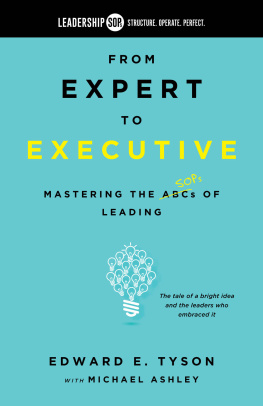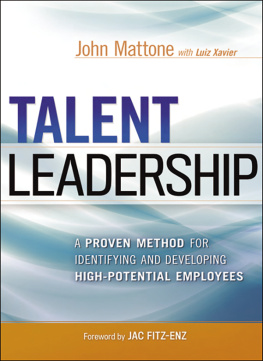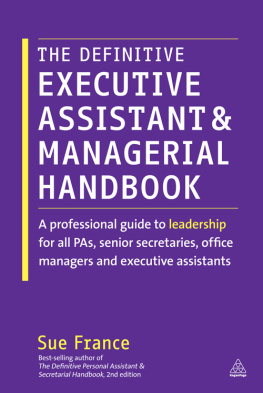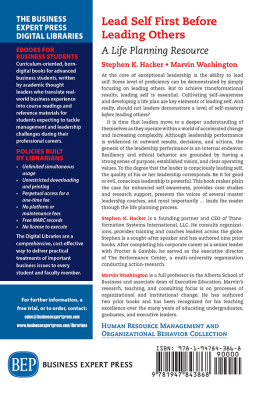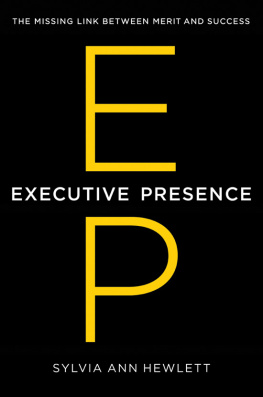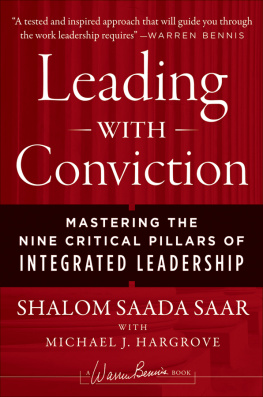From
Expert
to
Executive
Mastering the ABC s SOPs of Leading
The tale of a bright idea and the leaders who embraced it
Edward E. Tyson
with Michael Ashley
PerSynergy Press
Dove Canyon, CA
2020
Copyright 2020 LeadershipSOPs.
All rights reserved. No part of this publication may be reproduced, distributed, or transmitted in any form or by any means, including photocopying, recording, or other electronic or mechanical methods, without the prior written permission of the publisher, except in the case of brief quotations embodied in critical reviews and certain other noncommercial uses permitted by copyright law. For permission requests, write to the publisher, addressed Attention: Permissions Coordinator, at the address below.
ISBN: 979-8-64379553-7
Any references to historical events, real people, or real places are used fictitiously. Names, characters, and places are products of the authors imagination.
Book cover and interior design by Claudine Mansour Design
PerSynergy Press
5 Somerset
Dove Canyon, CA 92679
www.LeadershipSOPs.com
www.PerSynergyConsulting.com
To those who endeavor to accomplish together
what they could never do alone.
Introduction
Every step on the journey from expert to executive leads away from your craft. This sentiment is easier to grasp than embrace; and neither grasping nor embracing it is a requirement for reaching the rank, responsibilities, or rewards of an executive. As you may know from firsthand experience, many experts successfully climb the career ladder unaware their value to the organization is shifting. With each step, they continue to cling to their technical capabilities, hanging onto the belief that it is the autonomy, scope, and impact of their work (not the work itself) that is changing. These leaders pour their lives into their work, many of them producing outstanding results and widespread accolades.
Meanwhile, under the surface, a dangerous dynamic is unfolding. The more time a leader spends on the teams work (the technical work), the less time they leave for leading. Strategy development and coordination, organizational alignment, coaching, and other responsibilities get pushed aside in favor of solving technical puzzles and doing the tactical work. Additionally, as these leaders lean in too hard and too far into the teams work, they cant help but displace or knock into those who are supposed to be doing it. This is often intimidating and awkward for the team. Even when it is welcome, and the team asks for the support, it can result in lower employee engagement and the stagnation of capabilities as the leader continues laying claim to the most interesting and advanced work of the team.
Clearly, the longer this cycle continues, the worse the consequences can be for any organization. However, as employee dissatisfaction grows and team capabilities flatline, these departments become even more dependent on their overzealous executives (because the team is no longer capable of doing the work on its own). This dynamic complicates changing course and reinforces the leaders idea that it is their technical skills the company values most.
Certainly, this is not the case for every expert who accepts the leadership challenge. I do not intend to paint everyone with the same broad brush. Indeed, on the other side of this coin are leaders with technical backgrounds who instantly discover they have entered a vastly different worlda world with a new set of challenges for which their previous studies and experiences have left them unprepared. These leaders often act quickly to seek out resources to help close the knowledge gap and aid in their transformation.
Tragically, it doesnt matter if you are a leader who instantly gets it or if you are one who experiences an uncomfortable, midstream awakening. All paths lead to a $360 billion training industrial complex producing a lot of concepts, content, coaches and trainersbut not enough leading.
As an executive coach and consultant, I work with executives every day. Most report being either ill-equipped or too busy to lead. Further, they are not satisfied with the leadership they see occurring above or below them. Likewise, the Global Leadership Forecast 2018, jointly published by DDI, The Conference Board and EY, showed only 14 percent of CEOs surveyed believed they have the leadership talent necessary. Everyone, it seems, is troubled by the amount of time leaders spend leading (versus doing), yet the problem persists.
Why arent we getting a sufficient return on our development dollars? Is the problem that we arent getting a return at all, or are we simply not getting a lasting return? Are we clear about what we are trying to achieve or measure? What do we mean when we say leaders need to spend more time leading and less time doing? Is it possible to measure how much someone leads (can we know if they are doing it more or less)?
These are just a few of the difficult questions preoccupying my mind over the past several years. Since I am a practitioner, I have been investigating these problems introspectively, through my work and with my colleagues (versus through research). Answers came to me slowly at first, then in bunches. In the end, I believe I uncovered a simple truth: our leaders arent leading because we havent clearly defined the term or differentiated their work from their teams work. We have allowed leadership to be reduced to competency decks comprised largely of interpersonal skills and leadership styles versus the real work of leading. We dont teach soccer strikers sportsmanship and expect them to understand their position on the field of play. Yet, this is exactly what we do for leaders.
My journey of reflection, trial and error brought me newfound clarity, conviction and results. I spent the past several years packaging these ideas into a simple but surprisingly robust framework (explaining the work of leading and why we do it) and a powerful methodology (detailing the path to personal mastery, enhanced collaboration and effective mentoring).
The balance of this short Introduction explores this model by investigating three of the most important insights I had while composing it. The rest of the book, however, takes a completely different approach, wrapping the model in a compelling fictional tale designed to transport you into the minds of several reluctant leaders (from CEOs to supervisors) who use both the framework and methodology to better grasp what leading is and choose it over their areas of expertise.
Insight #1
Leading is a process
I started my small coaching and consulting business after serving in the Marine Corps, earning degrees in philosophy and organizational development, and spending 15 years climbing the corporate ladder. I was very proud of my modest accomplishments. This pride, combined with my need to differentiate my business, drove a burning desire to say my coaching practice was different and better than those to my right and left. Unfortunately, from a process perspective, my practice was completely unremarkable... and so were my results. In the near-term, my clients were ecstatic. However, looking across years, I found many struggled to continue their growth, and some even regressed. I was frustrated. Why was I unable to consistently create lasting results? What could I do to help my clients beat the odds? What could I do that was better and different?
As a coach, I administered self and multisource assessments (such as personality tests and 360 degree feedback surveys). I helped my clients consider and set professional development goals. My clients and I created thoughtful action plans focused on reframing limiting thoughts and beliefs, identifying and overcoming knowledge gaps, and experimenting with new behaviors. In short, I was doing what most good executive coaches do... but, for some reason, I was expecting better results. As a former vice president of process improvement, the irony of this was not lost on me. Yes, doing the same thing again and again (just like everyone else) and expecting a different result is the definition of insanity. We can thank Dr. Einstein for giving this bit of insight to us.
Next page
